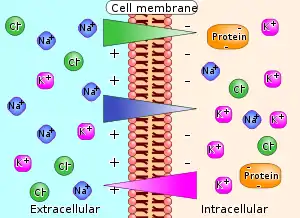The Vital Question
The Vital Question is a book by the English biochemist Nick Lane about the way the evolution and origin of life on Earth was constrained by the provision of energy.
 | |
| Author | Nick Lane |
|---|---|
| Subject | Origin of life |
| Genre | Popularisation of science |
| Publisher | Profile Books |
Publication date | 2015 |
| ISBN | 978-0-393-08881-6 (Hardcover) |
About the book
Nick Lane is a biochemist at University College London. He researches "evolutionary biochemistry and bioenergetics, focusing on the origin of life and the evolution of complex cells."[1] He won the Michael Faraday Prize in 2016 for "excellence in communicating science to UK audiences."[2]

In the book, Lane discusses the nature of life and living. He looks at the relationship of energy to the origin of life, and the emergence of cells, and the growth in cell complexity. He then discusses sex, and the origin of death. Finally, he makes a set of predictions. The book concludes with an epilogue and glossary.
The book is illustrated with 37 figures taken by permission from a wide variety of research sources. They include a timeline, photographs, cladograms, electron flow diagrams and diagrams of the life cycle of cells and their chromosomes.[4]
The book was first published by Profile Books in 2015. A paperback edition came out in 2016. The book has been translated into at least six languages, namely Chinese, German, Japanese, Korean, Polish, and Spanish.[5]
Reception

Tim Requarth, reviewing The Vital Question for The New York Times, notes that Charles Darwin had speculated that life might have begun in some "warm little pond", but Lane shows this could not have happened. Instead, Lane argues that, in Requarth's words, "life emerged from towering rock formations on the ocean floor, where heated, mineral-laden water spewed from the inner Earth through the rock’s hollow network of cell-size compartments. These rocks contained the ingredients necessary for life’s start, but most important, their natural temperature and energy gradients favored the formation of large molecules." A proton gradient (unrelated to the natural temperature and energy gradients aforementioned) drives "a remarkable, turbinelike protein, ATP synthase" to rotate, capturing energy in usable chemical form. "This bizarre mechanism, as universal as DNA, is as counterintuitive as anything in science", observes Requarth, who finds the book "seductive and often convincing, though speculation far outpaces evidence in many of the book’s passages. But perhaps for a biological theory of everything, that’s to be expected, even welcomed."[6]
The science writer Peter Forbes, reviewing The Vital Question in The Guardian, noted that the origin of life was once thought to be "safely consigned to wistful armchair musing", but that in the past 20 years new research in genomics, geology, biochemistry and molecular biology have transformed thinking in the field. "Here is the book that presents all this hard evidence and tightly interlocking theory to a wider audience.", writes Forbes.[7]
Michael LePage, reviewing the book in New Scientist, writes that the fact that complex cells only evolved once is "very peculiar when you think about it", but it is just one of many large mysteries that Lane addresses, including aging and death, sex, and speciation. LePage finds Lane's arguments "powerful and persuasive", with many testable ideas. The book is not, he writes, the easiest to read, but "it does tell an incredible, epic story", from the dawn of life to the present day.[8]

Caspar Henderson, reviewing the book in The Telegraph, writes that the book "succeeds brilliantly" as good science writing can, expanding the reader's horizons "in ways not previously imagined." Lane explains why the counterintuitive idea "that cross-membrane proton gradients power all living cells" is no mere technical detail: per gram, he notes, the power is 10,000 times denser than the sun, and it is conserved across every form of life, telling us something about how life began and how it was constrained to evolve. Henderson recommends the book as amazing and gripping, only criticising the publisher for the "pedestrian" quality of the design and printing.[9]
The founder of Microsoft, Bill Gates, reviewed the book under the heading "This Biology Book Blew Me Away". It moved him to read two of Lane's other books, and to bring him to New York to interview him. Gates noted that "As much as I loved The Vital Question, it’s not for everyone. Some of the explanations are pretty technical. But this is a technical subject, and I doubt anyone else will make it much easier to understand without sacrificing crucial details."[10]
References
- Lane, Nick. "About". Nick Lane: Biochemist and Writer. Retrieved 17 April 2017.
- "Michael Faraday Prize and Lecture". Royal Society. Retrieved 17 April 2017.
- Lane 2016, pp. 102–110.
- Lane 2016, pp. 334–337.
- "ti:The Vital Question au:Nick Lane". WorldCat. Retrieved 17 April 2017.
- Requarth, Tim (20 July 2015). "Book Review: Taking on 'The Vital Question' About Life". The New York Times.
- Forbes, Peter (22 April 2015). "The Vital Question by Nick Lane – a game-changing book about the origins of life". The Guardian.
- LePage, Michael (22 April 2015). "The Vital Question: Finding answers about the origin of life". New Scientist.
- Henderson, Caspar (24 April 2015). "The Vital Question: Why Is Life the Way It Is? by Nick Lane, review: 'astonishing and intriguing". Daily Telegraph.
- Gates, Bill (27 April 2016). "This Biology Book Blew Me Away". GatesNotes.
Sources
- Lane, Nick (2016). The Vital Question: Why is Life the Way it is? (paperback ed.). Profile Books. ISBN 978-1-781-25037-2.CS1 maint: ref=harv (link)